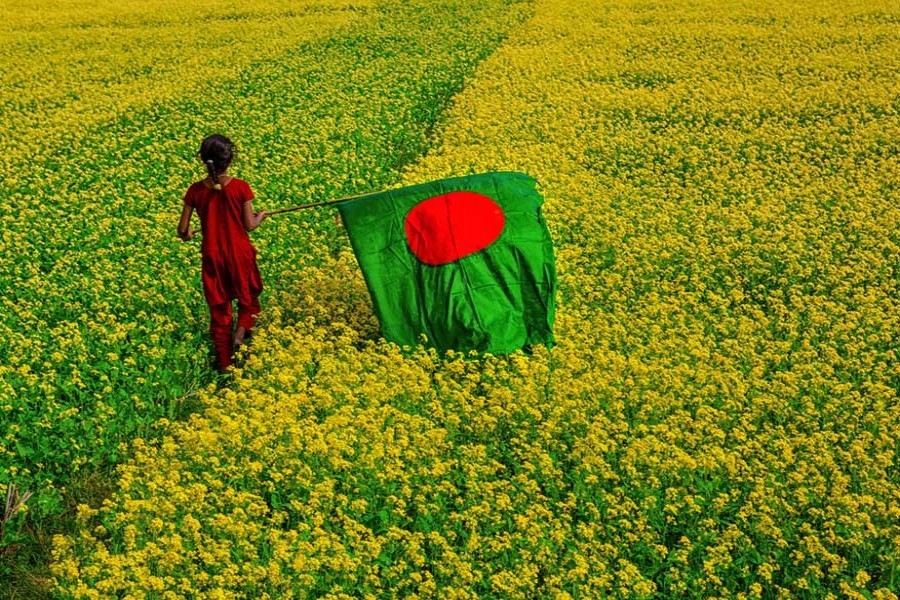Joyous celebration of an occasion like that of the Independence Day is always special to any nation. And when independence is achieved at the cost of blood, the celebration assumes even greater significance. Bangladeshis are such a nation and it celebrates today (Monday) its 47th anniversary of independence. The people here will obviously recall the past -- a past full of poignancy as much as of bravery, followed by triumphant rejoicing. The victory in the war of independence came at the cost of hundreds of thousands of lives; thousands of women were victims of rape, amid widespread sufferings of millions. Infrastructures were massively destroyed. Besides, ten million people were forced to take refuge in neighbouring India. Sacrifices made and losses sustained during the war cannot be forgotten but the victory over the Pakistani occupation army will always remain a source of great joy and celebration.
On this auspicious occasion, the nation will pay its tributes to the memory of its founding father Bangabandhu Sheikh Mujibur Rahman. It will also offer its tributes to the martyrs of the liberation war and other leading lights of its arduous struggle for freedom and independence. The Independence Day, apart from its celebration, offers also an opportunity to the nation to take stock of its success and discomfiture, keeping in view the cherished objectives of the freedom fighters that had prompted them to wage an uneven war against a better trained yet brutal army. In this context, the people have strong reasons to rejoice one particular achievement: Bangladesh, notwithstanding some of its disconcerting aspects, is now well ahead of Pakistan in terms of many notable social and economic indicators.
Besides, the country has already met the preliminary requirements on way to gaining the UN-endorsed official status of a middle income country in the year, 2024. A very consistent economic growth performance over the past many years in a row has helped the country to earn this distinction. Poverty, which once was dismally high, has gone down remarkably with a notable rise in per capita income. The country has also made a great stride in food production and is now almost self-sufficient on that account. Efforts are also on to improve power, energy and other physical infrastructures, the inadequacy of which has been hurting investment and production since long.
Yet there are a number of undesirable weaknesses that need to be duly taken note of. The country's record on governance, graft control and institution building -- the factors that are interlinked -- has not yet improved remarkably. There are also questions about the quality of democracy, distribution of benefits of economic progress and ensuring social justice. Empirical evidence is also there about the widening income inequality in Bangladesh, despite drop in the rate of poverty reduction in recent years. The country has improved its position lately in the global corruption perception index but the ground reality is that people are still counting a heavy cost because of widespread, systemic corruption.
On this auspicious day, the people do also need to ponder on, at least, a couple of immediate issues on which depends the country's smooth journey on course of meaningful democracy and economic progress. One such issue relates to the next general election and the other, to the current state of the financial sector. On the first count, divisive politics, marked by bitter rivalry, does unfortunately continue to impede the democratic journey of the nation and an end to it is still not in sight. As a sequel to that, the ongoing developments tend to indicate to an uncertain political climate over the upcoming national elections. On the second count, the situation in the financial sector is even worse. The banking industry that was floating in excess liquidity even some months back, faces now a severe shortage of it. Banks have been forced by circumstances to hike both deposit and lending rates. Overall, the situation in the financial sector thus remains fragile, casting its gloomy shadows over the growth of business and investment.
The nation has thus still to go a long way towards curing many of its long-lingering ills, initiating reforms in many areas, strengthening its institutions, reducing income inequality, promoting pro-actively sustainable and inclusive development and, thus, fulfilling the democratic aspirations of the people, despite having scored quite notable progress in many areas since its independence. It will be too difficult to avoid an unsavoury situation in the coming days, if such long-lingering problems are not addressed properly and well in time. Hopefully, the spirit of the Independence Day would inspire all concerned to make concerted efforts for doing the needful as expeditiously as possible in the greater interest of the nation.


